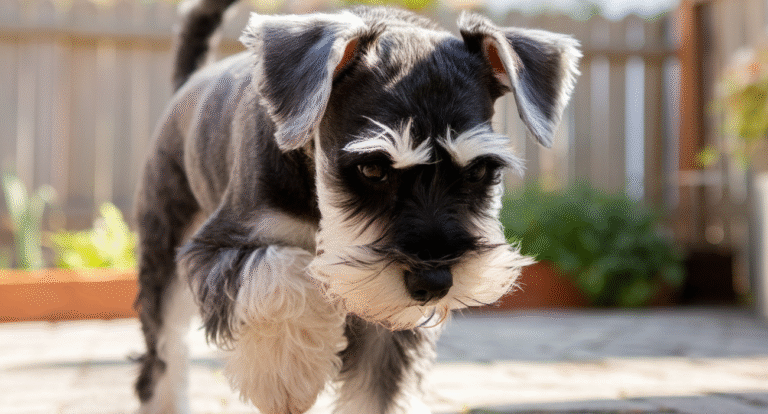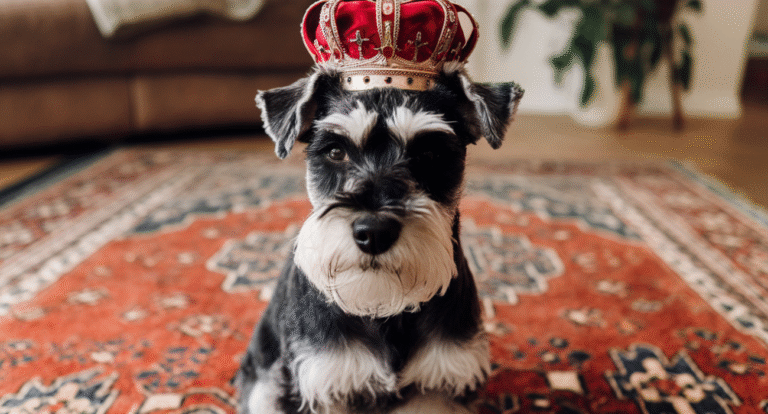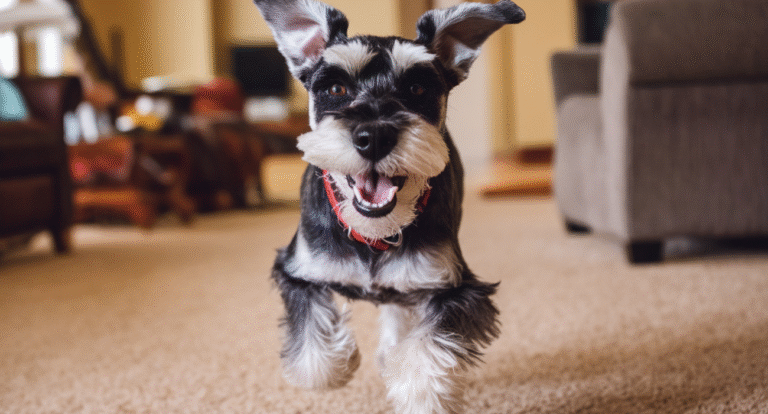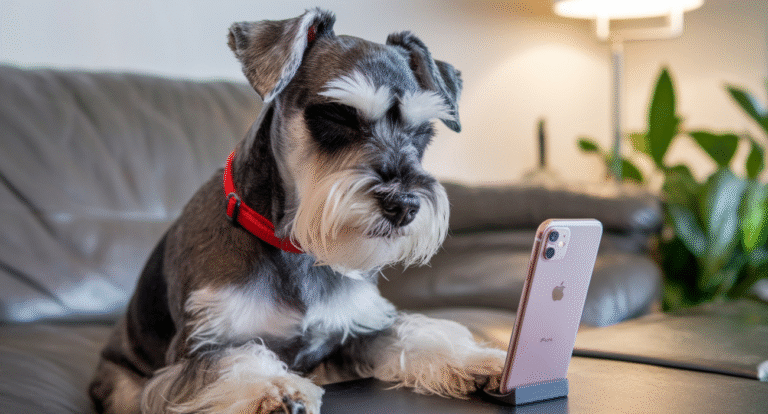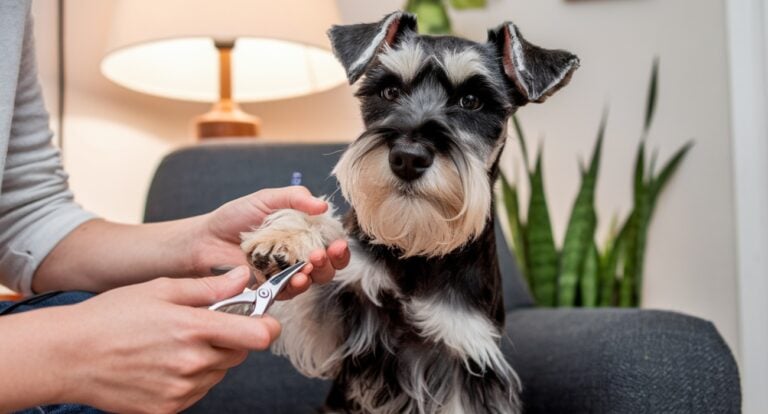Test your Schnauzer knowledge with this fun trivia quiz. See if you can outsmart your clever pup on every question.
Pop quiz time! And no, we’re not talking about your high school history exam. We’re diving whiskers first into the wonderful world of Miniature Schnauzers, and trust me, this is way more fun than memorizing dates. These sassy little dogs strut around like they own the place (because in their minds, they absolutely do), but how much do you really know about them?
Sure, you can spot that signature salt and pepper coat from a mile away, and yes, you’ve probably noticed they’re basically small dogs with gigantic opinions about everything. But can you ace questions about their quirky history, their surprising talents, and those adorable behavioral quirks that make Schnauzer owners laugh every single day?
Grab your thinking cap (maybe one with ear flaps like those fuzzy Schnauzer ears) and let’s find out if you’re a genuine expert or just schnauzer curious!
Question 1: Where Did Miniature Schnauzers Originally Come From?
A) England, where they were bred as lap dogs for royalty
B) Germany, where they worked as ratters on farms
C) France, where they were companions to artists
D) Scotland, where they herded sheep in the highlands
If you guessed B, you’re absolutely correct! These feisty little characters hail from Germany, specifically emerging in the late 19th century. Miniature Schnauzers were developed by crossing Standard Schnauzers with smaller breeds like the Affenpinscher and possibly the Poodle. Their original job? Being the ultimate pest control specialists on German farms. They were tasked with hunting rats and other vermin in stables and barnyards, which explains their tenacious, fearless attitude that persists to this day.
Here’s something fascinating: Despite their small size, Miniature Schnauzers possess the heart of a much larger dog. That “big dog energy” you see in your Schnauzer isn’t attitude; it’s literally bred into their DNA from centuries of fearless vermin hunting.
The breed quickly became popular not just for their working abilities but for their adaptability as family companions. By the early 1900s, they’d transitioned from farm dogs to beloved household pets, though they never quite lost that instinct to patrol their territory and alert their humans to every. Single. Thing. Happening. Outside.
Question 2: What Distinctive Feature Makes Miniature Schnauzers Stand Out?
A) Their curled tail
B) Their beard and bushy eyebrows
C) Their spotted tongue
D) Their webbed feet
The answer is B, and if you’ve ever met a Miniature Schnauzer, you already knew that! Those magnificent facial furnishings are the breed’s signature look. The beard (technically called “furnishings”) and those expressive eyebrows give Miniature Schnauzers their distinguished, almost human-like appearance. It’s like they’re perpetually judging your life choices or contemplating the mysteries of the universe.
These facial features aren’t just for show, though. Originally, that wiry coat and facial hair provided protection when they were diving into rat holes and confronting vermin. The coarse outer coat and softer undercoat worked together to shield them from bites and scratches. Today, those eyebrows serve the much more important purpose of making their judgmental stares approximately 500% more effective when you’re eating something they want.
Question 3: How Many Color Varieties Are Recognized by the American Kennel Club?
A) Two
B) Three
C) Five
D) Seven
The correct answer is B! The American Kennel Club recognizes three official color varieties for Miniature Schnauzers: salt and pepper (the most common), black and silver, and solid black. The salt and pepper coloring, with its distinctive banded hairs that create a gorgeous gray appearance, is the classic Schnauzer look that most people recognize instantly.
However, here’s where things get interesting for color enthusiasts. Some breeders produce white Miniature Schnauzers and even parti-colored ones (white with patches of color), but these aren’t recognized by the AKC breed standard. That doesn’t make them any less adorable, mind you; it just means they can’t compete in conformation shows. For families looking for a pet rather than a show dog, any color Schnauzer makes an equally wonderful companion!
| Color Variety | AKC Recognition | Typical Characteristics |
|---|---|---|
| Salt and Pepper | Yes | Most common; banded hairs create gray appearance with darker facial mask |
| Black and Silver | Yes | Black body with silver furnishings on eyebrows, beard, legs, and chest |
| Solid Black | Yes | Entirely black coat; may have small white chest spot |
| White | No | Not AKC recognized; produced by recessive genes |
| Parti-Color | No | Not AKC recognized; white base with colored patches |
Question 4: What’s the Average Lifespan of a Healthy Miniature Schnauzer?
A) 8 to 10 years
B) 10 to 12 years
C) 12 to 15 years
D) 15 to 18 years
If you selected C, congratulations! Miniature Schnauzers typically live between 12 to 15 years, which is excellent news for anyone who falls in love with these spirited little companions. Some particularly healthy individuals have even been known to reach 16 or 17 years, giving their families plenty of time to create lasting memories together.
This impressive longevity is one of the many reasons Miniature Schnauzers consistently rank among America’s most popular breeds. When you combine their relatively long lifespan with their robust health (compared to some other breeds plagued with genetic issues), minimal shedding, and adaptable size, you’ve got a recipe for an ideal family dog. Of course, reaching that upper end of the lifespan spectrum requires proper care, regular veterinary checkups, appropriate exercise, and a quality diet. But give a Miniature Schnauzer the care they deserve, and they’ll be your devoted shadow for well over a decade.
Question 5: What Activity Level Best Describes Miniature Schnauzers?
A) Couch potato who prefers napping
B) Moderate energy requiring daily walks
C) High energy needing constant activity
D) Variable depending entirely on mood
Answer B is the winner here! Miniature Schnauzers fall squarely into the moderate energy category. They’re not marathon runners who need hours of intense exercise, nor are they lazy lap dogs content to lounge around all day (though they certainly enjoy a good cuddle session). These dogs thrive on daily walks, some playtime, and mental stimulation to keep their clever minds occupied.
Think of Miniature Schnauzers as the Goldilocks of the dog world when it comes to exercise: not too much, not too little, but just right. A couple of good walks, some interactive play, and maybe a training session will keep them happy, healthy, and out of mischief.
This moderate activity level makes them perfect for various living situations. Apartment dwellers appreciate that Miniature Schnauzers don’t require a massive backyard or hours of running. Suburban families love that they’re active enough to join in family activities and play with kids. Seniors find them manageable yet engaging enough to encourage regular, healthy activity. Just remember: a bored Schnauzer is a destructive Schnauzer. Keep that intelligent brain busy, or they’ll find their own entertainment (usually involving something you’d rather they didn’t chew).
Question 6: Which Statement About Miniature Schnauzer Shedding is True?
A) They shed heavily twice per year
B) They’re considered a hypoallergenic breed with minimal shedding
C) They shed constantly year-round
D) They don’t grow fur, only hair that never sheds
The correct answer is B! Miniature Schnauzers are often recommended for people with dog allergies because they’re considered hypoallergenic. Now, let’s be clear: no dog is 100% hypoallergenic (people react to dander, saliva, and proteins, not just fur). However, Miniature Schnauzers shed significantly less than most breeds, making them a fantastic option for allergy sufferers.
Their double coat consists of a wiry outer layer and a soft undercoat. Rather than shedding naturally like many breeds, their dead hair tends to stay trapped in the coat until it’s removed through grooming. This is why regular grooming is absolutely essential for Miniature Schnauzers. They need professional grooming every six to eight weeks, including either hand stripping (for show dogs) or clipping (for pets). Between professional appointments, regular brushing several times per week keeps their coat healthy and prevents matting.
Question 7: What’s a Common Behavioral Trait in Miniature Schnauzers?
A) Excessive barking and alertness
B) Extreme shyness around strangers
C) Inability to be trained
D) Disinterest in their family members
Option A is spot on! Miniature Schnauzers are notorious barkers. They take their self-appointed job as household watchdog very seriously. A leaf falls outside? Bark. The mail carrier approaches? BARK. A squirrel exists somewhere in the general vicinity? BARK BARK BARK. This vigilant nature comes directly from their heritage as farm dogs who needed to alert their humans to any potential threats.
While this alertness makes them excellent watchdogs (no one’s sneaking up on a house with a Miniature Schnauzer on duty), it can become problematic if not properly managed. Early training is crucial to teach them the difference between legitimate alerts and unnecessary noise. The good news? Miniature Schnauzers are highly intelligent and trainable, so with consistent, positive reinforcement training, you can absolutely teach them appropriate barking behavior.
Their bark might be bigger than their bite, but it’s definitely bigger than their body. Don’t let that compact size fool you; Miniature Schnauzers genuinely believe they’re formidable guard dogs, and they’ll defend their territory (your home) with vocal enthusiasm.
This breed’s intelligence is both a blessing and a challenge. They learn commands quickly, which makes training easier. However, they’re also smart enough to test boundaries and occasionally decide they know better than you. Consistent training, plenty of mental stimulation, and establishing yourself as a calm, confident leader will help channel that intelligence positively. Many Miniature Schnauzers excel in dog sports like agility, obedience, and rally, where their smarts and eagerness to work with their humans really shine.


